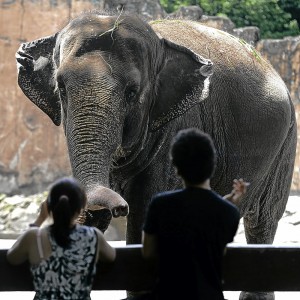‘Mali’ in pink of health, says elephant expert from Thailand
MANILA, Philippines—“Mali” the elephant appears to be in the pink of health—if a bit on the stout side—but it’s too early to tell if the most famous resident of the Manila Zoo should stay or go, a visiting Thai elephant expert said on Friday.
Amid the clamor from animal rights activists to ship her to a sanctuary in Thailand, Mali actually looks well cared for in her enclosure at the zoo, said Dr. Nikorn Thongtip of Kasetsart University’s Department of Large Animal and Wildlife Clinical Sciences.
“She looked healthy in every system. The color of the mouth is pink. It’s a good color. It means an elephant is healthy. And her skin is healthy, no wound. Just a little bit around the bone here, and that is good,” Thongtip told a briefing at the Ninoy Aquino Parks and Wildlife Center in Quezon City.
But Thongtip had a suggestion for the 38-year-old 7-ton giant: She needs to slim down.
“Just a little bit of obesity. [She’s] too fat,” he said. The scientist added that contrary to some reports, Mali’s nails “do not look bad, compared to elephants of the same age.”
Mali was brought to the Philippines from Sri Lanka in 1977 as a gift to then First Lady Imelda Marcos. She was 3 years old then and has spent 35 years at the Manila Zoo.
Animal rights activists led by the People for the Ethical Treatment of Animals have mounted a campaign to petition government to have Mali flown to an elephant sanctuary in Thailand, citing health problems and her apparent “loneliness” with no other elephants at the zoo for company.
Upon the request of the Department of Environment and Natural Resource’s Protected Areas and Wildlife Bureau, Thongtip was sent to the Philippines by the Thai government to check on Mali’s condition and make recommendations as to whether or not she could be transferred abroad and if she was fit enough to do so.
But Thongtip said a more thorough examination was needed before a decision could be made about moving Mali, including checking for tuberculosis, a serious problem afflicting Thailand’s elephants.
“Not now,” he replied, when asked if Mali should be moved to a sanctuary abroad.
“Because we have to check clearly [for tuberculosis]. Elephants in my country have this problem, too. We have TB in elephants, so we need to clear everything first,” he told reporters.
Thongtip said Mali could not be checked for TB as she had not been trained for the required specimen collections, including what he described as a “trickle wash.”
“We have to check but Mali is not trained for checking in this disease yet because we need to trickle wash her trunk … lip, [collect specimens and have them] sent to a laboratory for culture of the bacteria,” he said.
